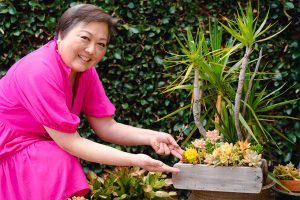Serving others by joining a cancer clinical trial
 At first, Genie Valarao had no interest in joining a clinical trial for her breast cancer.
At first, Genie Valarao had no interest in joining a clinical trial for her breast cancer.
“It sounded time consuming,” said Genie, an educator who teaches child development and parenting classes at an adult school in the Los Angeles area. “I thought it would be easier just to do my own standard treatment.”
It was late 2021, and Genie’s breast cancer had begun with a lump. A long-time Kaiser Permanente member, she alerted her primary care physician, who quickly referred her to oncologist Karen Kwan, MD, at the Kaiser Permanente Los Angeles Medical Center.
Genie’s diagnosis: triple-negative breast cancer, stage II. The tumor was removed through surgery, and now it was time to decide on medications to kill any remaining cancer cells. Dr. Kwan told Genie that, by participating in an ongoing clinical trial at Kaiser Permanente, she could get treated while also contributing data to improve treatment for future patients. Genie wasn’t able to make the decision in the moment.
But, back at home, she thought of her paternal grandmother who died from breast cancer at the age of 55 — the same age as Genie at her own diagnosis.
“I never got a chance to meet my grandmother,” Genie said. “I realized that by participating in the trial, there was nothing I could lose but there was something I could give back to other people, something I could leave here on earth to serve others.”
Genie’s clinical trial experience
Genie enrolled in one of the many clinical trials at Kaiser Permanente that are helping to advance cancer treatment. Her trial was designed for people with triple-negative breast cancer whose disease is considered to be particularly high risk.
Beginning in November 2021, through the trial, she received several rounds of different chemotherapy drugs followed by a few rounds of radiation. The trial was testing whether adding the drug carboplatin to an existing treatment regimen would lead to better outcomes.
“Being in a clinical trial ended up being a wonderful experience,” Genie said. “The care, attention, and communication were all there. I felt like the team was committed to me, and whenever I had concerns or questions, or didn’t know what to expect, they responded right away and relieved my anxiety.”
Key to Genie’s clinical trial experience was her research nurse Katrina Salgado, RN, who works with the Cancer Clinical Trials Access Program at the Los Angeles Medical Center.
“Katrina was my main contact for communication about any appointments or tests I had coming up, and if I wasn’t feeling good or had nausea or other side effects, she was able to give me resources and information,” Genie said.
Genie took a break from teaching while enrolled in the trial. “I was blessed to be able to stay home, because my side effects were pretty harsh,” she said.
To avoid getting COVID-19 and compromising her treatment, Genie limited her in-person social time, including with her 2 adult children. She also began attending her church remotely via livestream. However, her husband of 27 years provided steady companionship and drove her to her appointments.
Genie’s participation in the clinical trial wrapped up in April 2022 and left her cancer free for about 6 months. In fall 2022, her cancer returned. Still, she views her clinical trial experience as a success.
“For someone who is considering a clinical trial, I would say to them that it is a wonderful way to do your part to give back to the community,” she said. “Clinical trials move science forward and help give hope to others who are going through similar experiences.”
Leaving a legacy for future patients
Now, Genie has had a mastectomy and is receiving chemotherapy drugs and an immunotherapy drug known as pembrolizumab.
“It was a smooth transition out of the trial,” she said. “Dr. Kwan is still my oncologist, which is great because she already knows my medical history, and I am comfortable with her and trust her.”
Genie now has fewer side effects and has started teaching again. She still attends church remotely but is able to see her children in person more often. And while she loves to bake, she has cut down on sugar and has found joy in a new hobby: growing succulents in her garden.
“The way I look at it is, after a storm, there is going to be a rainbow,” she said. “The storms make you stronger and make you really thankful for the good things.”
In reflecting on her cancer experience, she often thinks of the grandmother she never met. “If she had access to the care I have today, I think I would have gotten the chance to spend time with her,” Genie said.
She hopes that, by sharing her own story, she will encourage others to participate in clinical trials.
“Sometimes it’s more convenient to just think about ourselves, but if we can think about what we can leave for the next generation, that is very powerful.”





